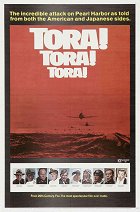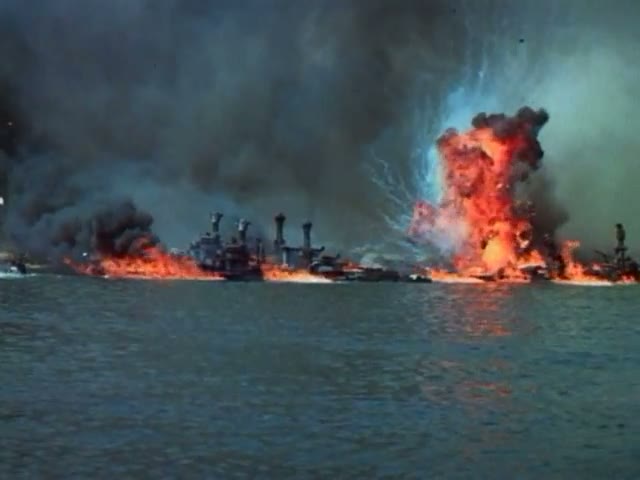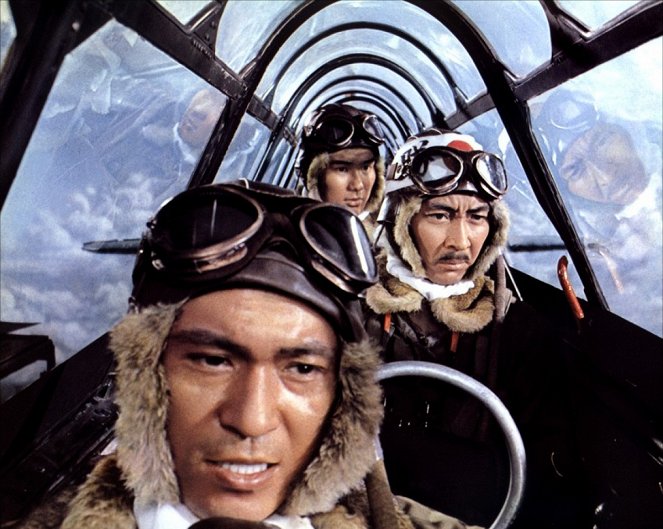Kamera:
Charles F. WheelerMusik:
Jerry GoldsmithBesetzung:
Martin Balsam, Sō Yamamura, Joseph Cotten, Tatsuya Mihashi, E.G. Marshall, James Whitmore, Jason Robards, Wesley Addy, Frank Aletter, Leon Ames (mehr)Inhalte(1)
Die Amerikaner haben es mit Hilfe der Dechiffriermaschine “Purple” geschafft, den Funkcode der Japaner zu knacken. Doch die Pazifikflotte wird nicht mit dem Gerät ausgestattet. So ist man völlig unvorbereitet, als am 7. Dezember 1941 japanische Flugzeuge den US-Marinestützpunkt auf Hawaii, Pearl Harbor, angreifen. Mit dem Funkspruch “Tora! Tora! Tora!” wird der Erfolg des Angriffs gemeldet. (Verleiher-Text)
(mehr)Videos (1)
Kritiken (2)
Dieser Film ist hervorragend. Die Tatsache, dass beide Seiten des Konflikts an der Produktion beteiligt waren, sorgte für einen packenden fiktionalen "Fast-Dokumentarfilm" mit sehr guter technischer Umsetzung. Die Kampfszenen sind hervorragend, klar, überzeugend und mit einer kühnen Kameraführung ausgestattet, die ihrer Zeit voraus war (die wackeligen In-Action-Handaufnahmen haben mich wirklich überrascht). Die Dialoge sind sachlich, ohne Pathos, und der Film endet nicht mit der beleidigenden Fanfare amerikanischer Patrioten, sondern mit einer lakonischen Rede des in den USA ausgebildeten Admirals Yamamoto. Der dokumentarische Wert wird durch den unverhohlenen Hinweis auf die Unfähigkeit des US-Militärs, flexibel auf Geheimdienstwarnungen zu reagieren, und das pure Chaos in den Reihen der Verteidiger verstärkt (der grimmige schwarze Mann hinter dem Flugabwehr-Maschinengewehr von Arizona wirkt in diesem Zusammenhang wie ein fragmentarisches Zeitdokument). Als ehemaliger begeisterter Konsument von Hubáčeks Sachbüchern muss ich Tora! Tora! Tora! als akkurate Rekonstruktion würdigen werden, die ihrer Zeit weit voraus war, weil sie kein Pathos und keine nationalistische Emblematik enthielt. Das derzeitige Hollywood-Kino scheint zum albernen Kriegspathos der 1950er Jahre zurückzukehren...
()
After a very long time, I returned to Chuichi Nagumo today and I once again confirmed my opinion that this film by a Japanese-American director triumvirate made over fifty years ago will probably never be surpassed. Why do I think this? Because the creators achieved a similar result with just a few modified airplanes and some models as the British in Battle of Britain (1969). Of course, there were a number of inaccuracies. I couldn't help but notice the American influence, especially in the scenes strongly colored with patriotism (the battle of two P-40s against Italian Zeros was nice to look at, but it wasn't exactly realistic because Nippon was at its peak in 1941 not only in terms of the quality of its aircraft but mainly in terms of the quality of its aviators, who had already accomplished something by that time). I am not one of those who believe in conspiracy theories, but in the case of Pearl Harbor, I smell a betrayal. What I know is that President Roosevelt wanted to support the European (specifically British) fight against the Third Reich, but public opinion, and consequently legislators, were against it. There were a number of Japanese war provocations, the most conspicuous of which was the sinking of the gunboat Panay. Legislators refused to increase the army's and navy's budget; there was not a single truly valuable vessel in the harbor at the time of the attack. Then came the raid, which totally destroyed two obsolete battleships and seriously damaged six others, but these vessels were completely unusable in the first line. So "only" lives were lost, but it was precisely for this reason that the opinion of the American public unified with that of the president, the military and navy received their finances, and the US Navy returned all six second-rate battleships after repairs and modernizations. Most importantly, a gigantic plan to build a modern navy was set in motion. So, no matter how I look at it, I don't see this as a Japanese victory, and I strongly doubt that this was a surprise attack. What I believe is that war blockbusters should be made this way, and if today's filmmakers have almost all-powerful CGI at their disposal, I cannot understand how such crappy films like Pearl Harbor (2001) can be made. And I don't mean the sappy romance grafted on to it, I just don't understand why Michael Bay didn't have historically accurate replicas of ships generated. Maybe he just couldn't care less about it. The film does have some minor issues but I give it a five for how effortlessly it surpasses the current ones. / Lesson learned: Forewarned is forearmed. 5*-
()



Werbung